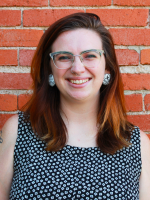For several years in different parts of Wichita – most notably downtown on the west bank of the Arkansas River – contestants from the International Gay Rodeo Association showed off their talents. Or just had a bit of fun.
The first gay rodeo was held in Wichita in the early 1990s, and the event continued here until the mid-2000s.
“People think ‘Oh, gay rodeo. What's that?’ Well, it is an actual rodeo,” Darlene Dunn said. “There's barrel racing, bull ridings, bronc riding, all that. But … you're just welcomed.”

Dunn helped organize some of the gay rodeo events in Wichita with her partner, Linda Frazier. They also helped create the Kansas Gay Rodeo Association.
Dunn and Frazier learned about gay rodeo through a clogging group they were a part of. After their first rodeo, they were hooked, even though they didn’t have much experience.
Dunn said that’s the beauty of gay rodeo. It’s just like any other rodeo, except women can compete in all of the events, and there’s beginner-friendly ones, too.
Dunn’s first event was the wild drag race. The event requires a team of three people, including a person in drag. The goal is for the person in drag to mount a steer, and eventually cross a finish line several feet away from the chute.
“I had a couple other gals from Oklahoma City give me advice that when you get the steer down to the line, if he doesn't want to go over the line, just put your shoulder right in his you know what, and push him over,” Dunn said.
“I did it. We took second place.”
While the gay rodeo eventually left Wichita, rodeos continue to be held across the country, including just a few hours away in Kansas City and Oklahoma City.

Janet Stange lives in Wichita and has a 4-H background. She competes in several events, including chute dogging and calf roping.
“I taught myself how to calf rope in the backyard with a lawnmower, a pushing lawn mower,” she said. “You have the pushing arms go out, so that makes you reach out.”
For Stange, participating in gay rodeo is not about winning, it’s about the people. She and several other friends called themselves the “Six Pack.” They would travel and sightsee while competing in rodeos.

She even met her wife at a rodeo years before.
“We're all family,” Stange said. “You know, we're competitors out there. But we care about each other.”
Others involved in gay rodeo feel the same. It’s not the events they talk about the most, but the camaraderie, especially not having to hide who they really truly are.
“I just think it was one of the best things and still do,” Frazier said. “If we had the energy and time, I'd still be participating in rodeo because … I love the people that we have met through it.
“And it's still kind of a part of who I am.”
Sound from Wichita’s previous gay rodeo event was provided by CowboyFrank.net


